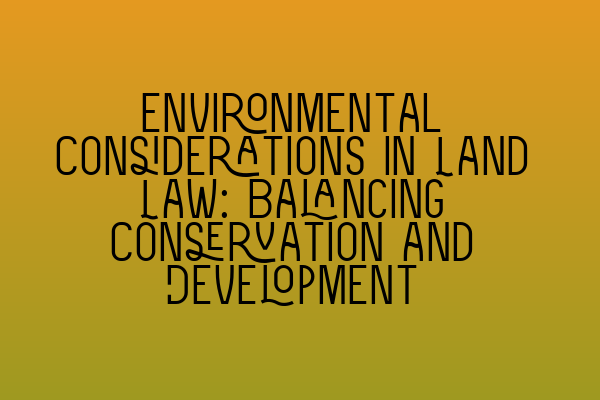Environmental Considerations in Land Law: Balancing Conservation and Development
In the realm of property and land law, there is a delicate balance that must be struck between conservation and development. As the demand for land and property continues to rise, it is imperative that we take into account the environmental impact of our actions. In this article, we will delve into the key environmental considerations in land law, exploring how we can adhere to regulations while still allowing for sustainable development.
The Importance of Environmental Considerations
Before we dive into the specifics, it is vital to understand why environmental considerations are of utmost importance in land law. As a society, we are becoming increasingly aware of the detrimental effects of human activities on the environment. Climate change, deforestation, and loss of biodiversity are just a few of the issues at stake.
By integrating environmental considerations into land law, we can ensure that development is carried out sustainably, taking into account the long-term impact on the ecosystem. This not only benefits the environment but also creates a more resilient and prosperous future for both individuals and communities.
Conserving Natural Resources
One of the primary environmental considerations in land law is the conservation of natural resources. From water to minerals, land law must take into account the sustainable and responsible use of these resources. This involves implementing regulations and guidelines that aim to protect and preserve our natural assets.
For example, in the UK, the Water Resources Act 1991 governs the management of water resources, ensuring its sustainable and equitable use. Additionally, the Minerals Planning Policy Statement provides guidance on the extraction of minerals while minimizing environmental damage.
By prioritizing the conservation of natural resources, land law contributes to a more sustainable and resilient future, reducing the impact of human activities on the environment.
Protecting Ecosystems and Biodiversity
Another crucial aspect of environmental considerations in land law is the protection of ecosystems and biodiversity. The loss of habitats and the decline of species have significant ecological, economic, and social consequences.
To address this, land law in the UK incorporates various mechanisms to protect ecosystems and biodiversity. The Wildlife and Countryside Act 1981 and the Conservation of Habitats and Species Regulations 2017, for example, provide legal protection for endangered species and habitats.
When embarking on development projects, it is essential to conduct environmental impact assessments to identify potential risks to ecosystems and biodiversity. These assessments help to determine appropriate mitigation measures and ensure that development proceeds in harmony with the natural world.
Promoting Sustainable Development
While the conservation of the environment is paramount, it is essential to strike a balance between conservation and development. Sustainable development is a key principle in land law, aiming to meet the needs of the present without compromising the ability of future generations to meet their own needs.
Integrating sustainable development into land law involves considering the long-term environmental, social, and economic impacts of development projects. This can be achieved through the use of planning regulations, environmental assessments, and policy frameworks.
By promoting sustainable development, land law contributes to creating resilient and vibrant communities, while simultaneously protecting the environment.
Conclusion
Environmental considerations play a critical role in land law, allowing us to strike a balance between conservation and development. By conserving natural resources, protecting ecosystems and biodiversity, and promoting sustainable development, land law can pave the way for a more sustainable and prosperous future.
Understanding and integrating these environmental considerations into legal frameworks is essential for solicitors and property law professionals. If you’re preparing for the SQE exam and looking for guidance on property practice, make sure to check out our related article: SQE Preparation for Property Practice: Mapping Out Your Strategy.
Additionally, staying updated on the latest changes in UK property laws is crucial. To learn more, read our related article: Updates in UK Property Laws: Key Changes and Implications.
For a comprehensive guide on legal challenges in property transactions, check out: Legal Challenges in Property Transactions: A Comprehensive Guide.
If you’re interested in lease laws in the UK, our article on navigating lease laws provides essential guidelines for tenants and landlords: Navigating Lease Laws in the UK: Essential Guidelines for Tenants and Landlords.
Lastly, to dominate property law questions and avoid common pitfalls, refer to our article on the subject: Dominate Property Law Questions: Avoiding Common Pitfalls.
